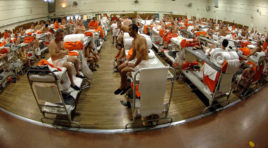I’m fascinated in how we compensate and incentivize employees. Not the actual process, but the decision-making process behind the what and how we do it. In my experience, how this usually goes is a two-level process:
First Level: Someone has a hunch, or it’s being done this way somewhere else.
Second Level: Someone in compensation searches for data to justify the hunch or data that agrees with what you want to do.
Real scientific, huh!?
Let me give you a real-world example that most of us are familiar with. We have a prison problem in America. We can all agree on this, correct? Prison populations are exploding and continuing to grow at an alarming rate.
Popular ‘theory’ says the reason behind this are based on a few situations. First, the war on drugs has caused the increase in more inmates in prison. Seems fair, we definitely hate those drugs. Second, for-profit private prisons have turned prisons into a business and this keeps prisoners in longer than they need to be. Third, minimum sentences and three-strike policies have people in prison for life for minor crimes and drug offenses.
What if you were to find out none of this is actually true? That in fact, the real reason we have exploded our prison population over the past two decades is because of one simple incentive program. This is probably going to piss you off! From The New Yorker:
“So what makes for the madness of American incarceration? If it isn’t crazy drug laws or outrageous sentences or profit-seeking prison keepers, what is it? Pfaff has a simple explanation: it’s prosecutors. They are political creatures, who get political rewards for locking people up and almost unlimited power to do it…between 1990 and 2007, while the crime rate began to fall, the number of line prosecutors went up by fifty percent, and the number of prisoners rose with it. That fact may explain the central paradox of mass incarceration: fewer crimes, more criminals; less wrongdoing to imprison people for, more people imprisoned….
Meanwhile, all the rewards for the prosecutor, at any level, are for making more prisoners. Since most prosecutors are elected, they might seem responsive to democratic discipline. In truth, they are so easily reëlected that a common path for a successful prosecutor is toward higher office. And the one thing that can cripple a prosecutor’s political ascent is a reputation, even if based on only a single case, for being too lenient. In short, our system has huge incentives for brutality, and no incentives at all for mercy.”
Go read the full piece in The New Yorker, it’s loaded with statistics to back up these real reasons for prison growth, and it’s an exceptional example of you actually get what you incentivize!
Many times we come up with incentive plans based on a short-term situation we want to change, but then years later those short-term incentive plans are still in place, and driving behaviors we never wanted or intended.
The other stat I loved from the article that we never hear in mainstream media or from our politicians is after the age of 40, most crime just stops. Basically, crime is young person’s game for the most part. If we were to release all prisoners at age 40, we would basically see no increase in the crime rate, but this will never happen. Why?
Because it only takes one. It takes one person getting out and committing another horrific crime and we all go, “See! It doesn’t work!” And, if it was someone I know, or god forbid my family, I’m probably right there with you. So, we lock up 7 Million Americans!
Be careful what behaviors you’re incentivizing, my friends, you actually just might get them!

While the proper use of the word would be “to incent”, both Merriam-Webster and OED recognize “incentivize” thus making it a real word. Pet-peeves not withstanding 🙂
Are there Compensation teams that keep using the same tired plans and programs every year? Of course, but this example isn’t Compensation’s fault. It’s like the trend now to uproot the formal performance review process. It’s the business leaders’ responsibility to decide what “success” means in their organization and how to best measure that. Then the Compensation function helps the organization best incent those desired behaviors and/or outcomes (along with avoiding unintended consequences as Paul says). In the absence of clear strategy or abundance of conflicting strategies, any reward is likely to reinforce the wrong message and cause a lot of inefficiency. I’m all for myth busting certain widely held beliefs, and most compensation folks I know are not afraid of changing direction based on clear data.
In my world we call that unintended consequences and something we spend a lot of time reviewing with clients – “if this happens, then this happens, then this… etc.”
FTR – incentivize is not a word!!!! (pet peeve)
Ha! Like something as small as “not being a word” ever stopped me! 😉